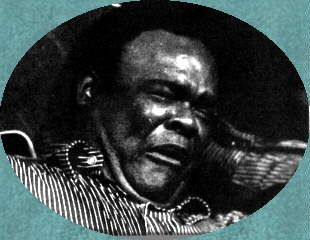

FREDDIE KING
Freddie King (no relation to any of the other blues guitarists named
King) was one of the lynchpins of modern blues guitar. Along with Otis Rush, Buddy Guy, and Magic Sam, King spearheaded
Chicago's modern blues movement in the early '60s and helped set the stage for the
blues-rock boom of the late '60s. His influence on such blues-rock titans as Eric Clapton helped preserve a
legacy characterized by searing, aggressive guitar solos and the welding of blues and rock
into one cohesive sound.
Although Freddie King was born and raised in Texas, he matured as a musician in Chicago.
His guitar style combined country and urban influences. As a child, King grew up on the
music of such legendary country blues guitarists as Blind Lemon Jefferson, Lightnin' Hopkins, and Arthur "Big Boy"
Crudup. After he and his family moved to Chicago in 1950, King began hanging out in
clubs where the stinging, city-hot guitar work of such Mississippi Delta-rooted blues men
as Muddy Waters, Jimmy
Rogers, and Eddie Taylor filled the air.
Though he first recorded in the 1950s-cutting sides for the obscure El-Bee label and doing
a few session dates for Chess, King didn't begin to attract attention until after he
signed with Federal Records in 1960. (Federal was a subsidiary of the Cincinnati-based
King Record label.) Under the guidance of pianist and King Records A&R man Sonny
Thompson, King's early-'60s sessions resulted in such stellar tunes as "Lonesome
Whistle Blues" and "I'm
Tore Down" (116 k, 10 sec.) as well as a potent rendition of the Bill Myles
classic "Have You Ever Loved a Woman." (Eric Clapton did a version of
the song during his Derek and the Dominos days.) In 1994, Clapton cut his own version of "I'm Tore Down"(114
k, 10 sec.) with remarkable resemblance to Freddy's original.
King also recorded numerous instrumentals in the early '60s. One song, "Hide
Away," reached number 29 on the Billboard pop charts in 1961 and ranks among the most
popular blues instrumentals ever recorded. Named for Mel's Hideaway Lounge, a noted
Chicago blues club, the song showcased King's guitar prowess and inventiveness in
combining catchy themes drawn from blues, rock, and rhythm & blues. Thanks to the
popularity of twangy guitar instrumentals in the early '60s, King was able to move freely
from blues to R&B to rock-flavored blues and novelty songs like "Bossa Nova
Watusi Twist," "Monkey Donkey," and "Surf Monkey."
King's relationship with Federal/King ended in 1968. Although King's most productive
period was over, he enjoyed a renaissance of sorts in the late '60s when English
blues-rock guitarists such as Clapton, Mick Taylor, and Peter Green began covering King
tunes and incorporating elements of his guitar style into their own. This brought King
renewed recognition and a growing audience among blues-rock fans, plus new recording
contract in 1968 with Cotillion, a subsidiary of Atlantic Records. Two years later King
jumped to Shelter Records. His last recording contract was with RSO Records in 1974.
Though the bulk of King's blues from this era leaned heavily toward funk and rock, his
guitar work remained stylish and supple.
King was only forty-two years old when he died in 1976 of bleeding ulcers and heart
failure.
Freddie's version of "I'm Tore Down" is from Freddy King Sings
Copyright © Modern Blues Recordings, 1989. (original released by King Records in 1961)
Eric Clapton's version of "I'm Tore Down" is from From The Cradle--Eric
Clapton Copyright © Reprise Records, 1994.